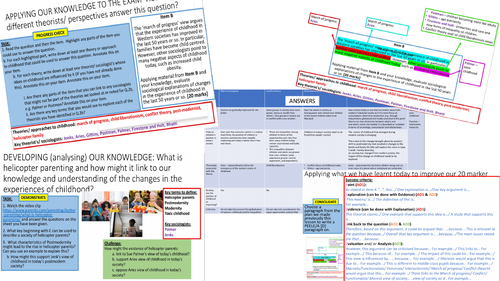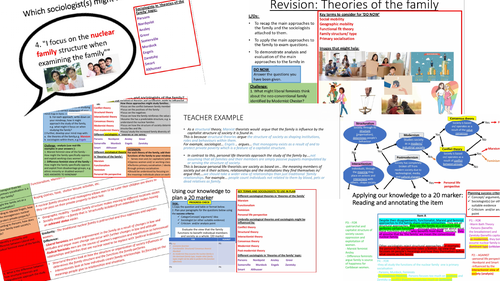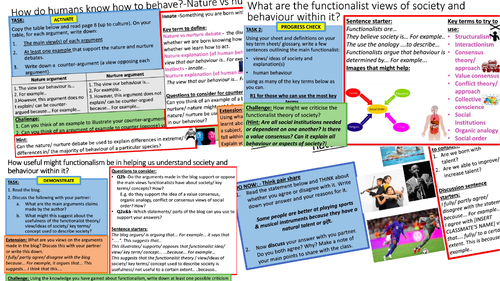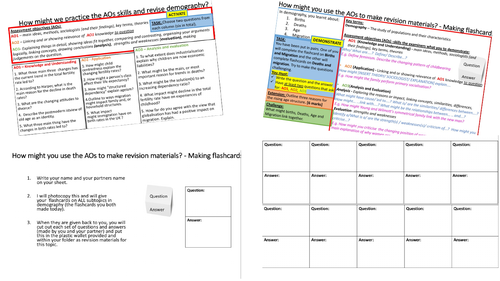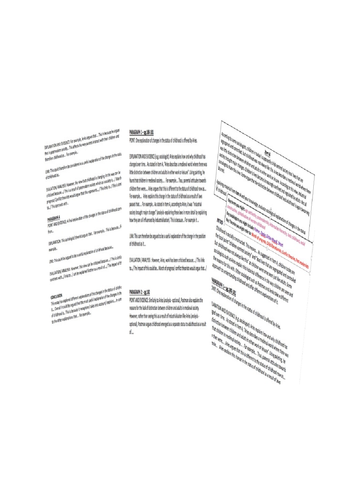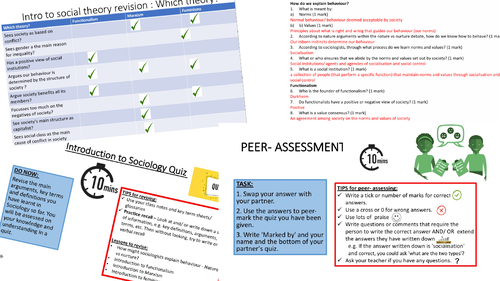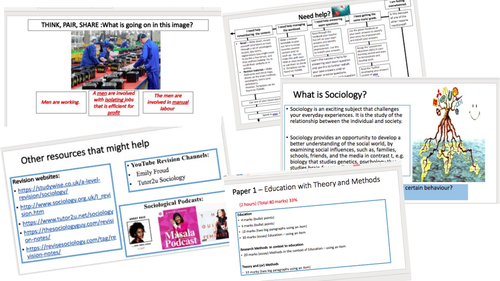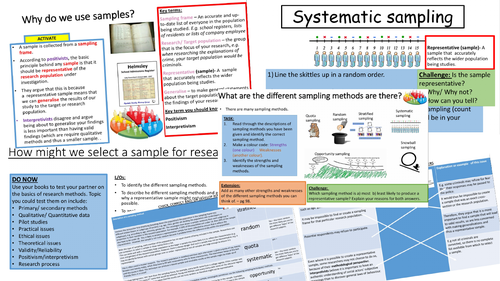
190Uploads
28k+Views
5k+Downloads
All resources

AQA A-level Sociology: Families Topic 2 ‘Childhood’ Revision lesson
Detailed and differentiated (up and down) student led lesson that supports students in recapping the main theories, views and explanations of the position of childhood; examines how march of progress, conflict, child liberationists and postmodernist theories’ view society and how this might influence their approach or view of childhood and its changes over time. Also highlights the key sociologists (Katz, Postman, Aries, Palmer, Jenks, Gittens) in this topic.
The lesson then requires students to apply this knowledge to plan (using a success criteria) a 20 marker and write at least one paragraph for it.
RESOURCES CAN BE FOUND AT THE END OF THE PPT.
MODEL PLAN AND ANSWERS FOR MAIN ACTIVITY CAN BE FOUND ON NEXT SLIDE AFTER ACTIVITY SLIDE

AQA A-level Families- Couples: Intro to the family structures/ types
Detailed and differentiated (up and down) student-led lesson that examines and analyses the following key terms to introduce students to the main family structures: Family, Household,Family structure/ type, Nuclear family, Lone-parent family, Same-sex family, Reconstituted family (or blended family) , Beanpole family, Extend family (horizontally and vertically) , Empty-nest family, Cohabitating couples, Contemporary society, Traditional, Family diversity, Living Apart Together/ LATs (extension)
***** ANSWERS for MOST MAIN activities INCLUDED****
***** ALL RESOURCES INCLUDED AND CAN BE FOUND OUT THE END OF PPT *****

AQA A-level Sociology: Theories of the Family Revision lesson -How to further develop exam answers?
Detailed and differentiated (up and down), student led lesson that:
recaps the key sociologists students learn in this topic and what they say about the function(S) of the family.
recaps the main umbrella theories that students learn in year 12 (structuralism vs interactionism, modernism vs postmodernism and conflict vs consensus theories), how they view society and how this influences functionalist, marxist, feminist and personal life perspective approaches to the family.
how the knowledge above can be applied to exam questions to demonstrate both analysis and evaluation (AO3), e.g. by highlight the similarities and differences between the different theories of family or using knowledge of the umbrella theories to evaluate theories of the family.
supports students with planning a 20 marker on theories of the family using the item.
**RESOURCES CAN BE FOUND AT THE END OF THE PPT.
***
**ANSWERS FOR MOST OF THE ACTIVITIES CAN BE FOUND ON NEXT SLIDE AFTER ACTIVITY SLIDE
**
INCLUDES ORACY ACTIVITY
Bundle

A-LEVEL SOCIOLOGY INTRO LESSONS - nature vs nurture, functionalism, marxism, feminism, QUIZ & ANSWERS
Detailed and differentiated (up and down) student-led lessons that help students to develop their knowledge and understanding from previous lesson(s). L2 uses page 8 from AQA Book 1 by townsend but CAN BE USED FOR ANY SPEC using resources within lesson (see below). Comes with key term sheet for the lesson.
1. Introduction to Sociology - provides an overview of Sociology course (spec to AQA A-level but can easily be edited to suit ANY SPEC and GCSE) and the sociological imagination.
2. How do sociologists explain behaviour? -Nature vs Nurture lesson -explores the nature vs debate, norms, values, socialisation (primary/secondary) and social control as an introduction to Sociology. Uses page 8 of the AQA A-level Book 1 by Townsend to introduces students to the nature vs nurture debate but this can be replaced and the rest of the lesson can still be used.
3. Introduction to functionalism -explores value consensus, social order, biological/ organic analogy, structuralism, consensus theories to introduce students to the key functionalist views and ideas.
4. Introduction to Marxism -explores capitalism, ownership, interests, structuralism, conflict theories, exploitation as a way to introduce students to the main Marxist views and ideas.
5. Introduction to feminism - explores sex, gender, gender roles, patriarchy, socialisation, gender inequality as a way to introduce students to the main feminist views of society and ideas.
6. Quiz lesson - small revision activity
25 min quiz (on nature vs nurture, key functionalist, Marxist, feminist’s ideas and terminology) —LESSONS CAN BE FOUND ON MAIN PAGE. Includes:
answers/ mark-scheme
scaffolding for students to peer assess (but quiz can also be marked by teacher)
Made for AQA but can be used for ANY SPEC
Can be differentiated down for GCSE, but I recommend purchasing the GCSE Intro lessons bundle which have alread been edited to meet the needs of KS4 students.

Sociology Education Class differences in achievement- How to answer 30/ 20 markers?
Detailed and differentiated (up and down), student led lesson that explores:
the main assessement objectives - AO1, AO2, AO3
how to answer 30 markers
allows studeNts to revise class differences in achievement (external and internal factors).
**Can also be used as a revision lesson for topic 2 (class diff in achievement -internal factors) Includes student friendly success criteria for essay **
ANSWERS TO MAIN ACTIVITIES AND MODEL ANSWER INCLUDED
Made for AQA A-level but is applicable for AS-Level and can be used for ANY SPEC and is still paplicable for GCSE essays

Introduction to functionalism
Detailed and differentiated student-led lesson that explores value consensus, social order, biological/ organic analogy, structuralism, consensus theories as a way to introduce students to the main functionalist views and ideas. Can be used for ANY SPEC. Catered towards A-level students but can easily be simplified and/ or for younger students. Comes with key term sheet for the lesson.

AQA A-level Sociology: Families Topic 4 ‘Demography’ Revision lesson
Detailed and differentiated (up and down), student led lesson created to help students recap key ideas examined in the demography topic of the family unit, make revision materials based on this content and be able to apply this knowledge to exam questions, particularly 10 markers that makes links between topics - This lesson is very helpful for developing the skills students need for to answer ‘Outline and explain’ 10 markers which requires students to demonstrate the ability to connect two elements, aspects, subtopics, or topics to answer the question.
Lesson also recaps the assesment objectives (but can be used to introduce students to the assessment objectives) (AOs – AO1, AO2 & AO3). The lesson requires students to answers questions based on each AO and then provides guidance and support for students to use the AOs to make flashcards (with questions and answers).
**RESOURCES CAN BE FOUND AT THE END OF THE PPT.
**

AQA A-level Families - Couples: Money management and decision making
Detailed and differentiated (up and down) student-led lesson that examines and analyses the following key terms to examine how money might be managed and how decision-making might be organised in families : Power, The allowance system, Pooling, Cultural/ Ideological explanation (of decision making), Material/ Economic explanation of inequality (of decision making),Personal life perspective (of money)
Examines the views of the following sociologists:
PAHL AND VOGLER (1993), Barret and McIntosh, Kempson, EDGELL, Laurie and Gershuny, CROMPTON AND LYONETTE, Pahl
***** Makes reference to other key terms students might know that link. **
***** ANSWERS for MAIN activities INCLUDED****
Uses and refers to ’ AQA A Level Sociology Book One Including AS Level: Book one 3rd Revised edition by Rob Webb, Hal Westergaard, Keith Trobe, Annie Townend ’ textbook

AQA A-level Sociology: Families Topic 5 ‘Changing family patterns’ Revision lesson
Detailed and differentiated (up and down) student led lesson that
recaps changing family patterns learnt of Family Topic 5 and the reasons for them.
allows students to develop their AO2 (application) and AO3 (analysis) skills by considering the relationship changing family patterns might have with other aspects of the topic, as well as other topic in families and household, such as the domestic division of labour (couples), experiences of childhood (childhood), the characteristic of populations (demography).
***This part of the lesson is very helpful for developing the skills students need for to answer ‘Outline and explain’ 10 markers which requires students to demonstrate the ability to connect two elements, aspects, subtopics, or topics to answer the question. *
concludes by requiring students to apply this knowledge to ‘outline and explain’ 10 markers and one item 10 marker.
RESOURCES CAN BE FOUND AT THE END OF THE PPT.
ANSWERS FOR MOST OF THE ACTIVITIES CAN BE FOUND ON NEXT SLIDE AFTER ACTIVITY SLIDE

AQA A-level Sociology Education Topic 5 Role of education - The New Right view
Detailed student led lesson on the New Right critique and view of the purpose state education adapted to stretch and challenge the most able whilst scaffolding to allow pupils who need support the opportunity to access higher level thinking.
Covers the following key terms:
Neo-liberalism
The New Right
Conservatives
Voucher system
One-size-fits-all approach
League tables
Ofsted reports
National curriculum
Marketisation
Privatisation
Academies
Free schools
State schools
Social policies
Covers the following key sociologists: Chubb and Moe
Uses and refers to ’AQA A Level Sociology Book One Including AS Level: Book one 3rd Revised edition by Rob Webb, Hal Westergaard, Keith Trobe, Annie Townend ’ textbook
BRIEF ANSWERS TO THE MAIN ACTIVITY INCLUDED
NOTES -RESOURCES CAN BE FOUND AT THE END OF THE PPT.

WRITING FRAME - AQA A-level Sociology: Families – Topic 5 Changing patterns (divorce) 20 marker
Detailed writing frame that scaffolds (from introduction to conclusion) a full answer for a 20 marker on divorce (family -topic 5 changing family patterns). Models how to use the item to select points or arguments to answer the question.
*** Based on AQA specification**
Supports students with planning the 20 marker - using planning success criteria.
Outlines the success criteria and provides sentence starters for the full essay (intro, main body and conclusion). Success criteria used for paragraphs in main body of essay is PEELE/A
Outlines the key terms, sociologists, theories that can be used when answering the question.
Supports students who need support and guidance with writing essays whilst providing students who are already good at writing essays opportunities to further improve their essay skills.

WRITING FRAME - AQA A-level Sociology: Families – Topic 2 Childhood 20 marker
Detailed writing frame that scaffolds (from introduction to conclusion) a full answer for a 20 marker on divorce (family -topic 2 childhood. Models how to use the item to select points or arguments to answer the question.
*** Based on AQA specification**
*Outlines the success criteria and provides sentence starters for the full essay (intro, main body and conclusion). Success criteria used for paragraphs in main body of essay is PEELE/A
Outlines the key terms, sociologists, theories that can be used when answering the question.
Supports students who need support and guidance with writing essays whilst providing students who are already good at writing essays opportunities to further improve their essay skills.
PAGE NUMBERS From Webb et al Book 1 textbook included for 3/4 of paragraphs in main body.

Introduction to Sociology QUIZ
Includes:
small revision activity
25 min quiz (on nature vs nurture, key functionalist, Marxist, feminist’s ideas and terminology) —LESSONS CAN BE FOUND ON MAIN PAGE.
answers/ mark-scheme
scaffolding for students to peer assess (but quiz can also be marked by teacher)
Can be used for any spec
Made for A-level students but can be differentiated down for GCSE.

GCSE Sociology – Introduction to Marxism
explores capitalism, profit, social class, ownership, interests, structuralism, conflict theories, exploitation, false consciousness and social relations of production as a way to introduce students to the main Marxist views and ideas.
Includes answers for main activities
Resources can be found at the end of the PPT.
Made to meet the AQA spec but can be used (and edited if needed) for other exam boards

KEY SOCIOLOGIST SHEET - AQA A-level Sociology Education: Topic 3 Ethnic differences in achievement
Alphabetical list of sociologists who attempt to explain ethnic differences in achievement. SOME scaffolding with some sentence starters, prompts to help students with what some sociologists might says and put into external vs internal factors categories .
Requires students to write done what key sociologists from the topic ethnic differences in achievement (external and internal factors).
Good form of revision and revision resource for the students.
**BASED ON CONTENT in textbook - AQA A Level Sociology Book One Including AS Level: Book one 3rd Revised edition by Rob Webb, Hal Westergaard, Keith Trobe, Annie Townend ’ textbook

GCSE Sociology – Introduction to Feminism
explores sex, gender, gender roles, patriarchy, gender inequality as a way to introduce students to the main feminist views of society and ideas.
Includes answers for main activities
3 marker with a success criteria and student friendly mark-scheme
Resources can be found at the end of the PPT (worksheet is in folder).**
Made to meet the AQA spec but can be used (and edited if needed) for other exam boards

AQA A-Level Sociology Education PLC (EDITABLE)
Personal Learning Checklist for the education unit in the the AQA A-level Sociology syllabus.

Introduction to Sociology lesson
This is a lesson I use as an introduction to the AQA A-level Sociology course and to the sociological imagination or line of inquiry. The lesson includes:
an overview of the course, exam and curriculum
activities to introduce students to Sociology and sociological thinking/ inquiry.
suggested reading, podcasts, revision websites youtube channels that students can use to develop their knowledge and understanding of key ideas and concepts.
Expectations
Can be easily edited to meet your needs, e.g. specification, expectations and can also be used as an introduction to AQA GCSE Sociology .

SOCIOLOGY Research methods - Sampling methods
Detailed and differentiated student-led lesson that explores sampling methods, sampling frame, representative (sample), generalising (findings) and the relationship between these and positivism vss interpretivism and theoretical issues. LESSON COMES WITH ANSWERS
Catered for AQA A-level Sociology but can be used for ANY SPEC and GCSE without being edited.
Comes with key term sheet for the lesson.

AQA A-level Sociology: Media Topic 1 - Ownership and control of output
Detailed and differentiated (up and down), student led lesson that allows students to examine patterns of media ownership and the three main approaches (manipulative, hegemonic and pluralist) to media ownership and control of media output. Also introduces studets to the difference between Marxism and Neo-Marxism and links to structural vs humanistic marxism and structural determinsm. Examines the following concepts to do this: Ideology, Hegemony, Agenda-setting, Gate-keeping, News values, Marxism Neo-Marxism, Lords of the Global Village.
ANSWERS TO MAIN ACTIVITIES INCLUDED**
RESOURCES FOR LESSON CAN BE FOUND AT THE END OF PTT
Made for AQA A-level but can be easily used for other specs (just need a different source of information/ textbook)
**REQUIRES textbook - 'SOCIOLOGY For AQA Volume 2 by Browne, Blundell & Law **

